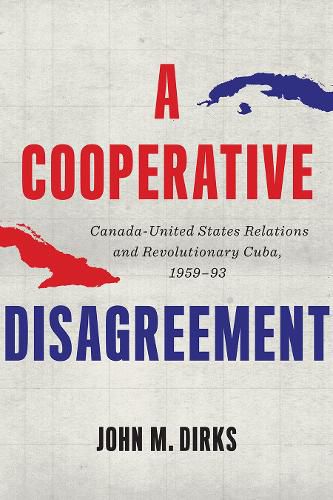Readings Newsletter
Become a Readings Member to make your shopping experience even easier.
Sign in or sign up for free!
You’re not far away from qualifying for FREE standard shipping within Australia
You’ve qualified for FREE standard shipping within Australia
The cart is loading…






A Cooperative Disagreement demonstrates how Canada and the United States successfully kept divergent policies on revolutionary Cuba from damaging their bilateral relationship. Covering the period from 1959 to the end of the Cold War, John Dirks investigates the efforts of Canadian and US diplomats and bureaucrats to cooperate despite their respective approaches toward Cuba. Washington sought the downfall of the communist regime through political and economic isolation. Ottawa chose engagement instead. The burden fell largely on Canada, as the smaller power, to mitigate potential frictions. Ultimately, these two North American powers continued to adhere to the hard policy boundaries set by their own governments while establishing a mutually beneficial relationship on issues of intelligence, travel, and other areas of engagement with Cuba. Drawing on archival documents from both sides of the border, many newly declassified, this comprehensive study reveals how officials in Ottawa and Washington managed to preserve bilateral harmony despite ongoing policy divergence
$9.00 standard shipping within Australia
FREE standard shipping within Australia for orders over $100.00
Express & International shipping calculated at checkout
A Cooperative Disagreement demonstrates how Canada and the United States successfully kept divergent policies on revolutionary Cuba from damaging their bilateral relationship. Covering the period from 1959 to the end of the Cold War, John Dirks investigates the efforts of Canadian and US diplomats and bureaucrats to cooperate despite their respective approaches toward Cuba. Washington sought the downfall of the communist regime through political and economic isolation. Ottawa chose engagement instead. The burden fell largely on Canada, as the smaller power, to mitigate potential frictions. Ultimately, these two North American powers continued to adhere to the hard policy boundaries set by their own governments while establishing a mutually beneficial relationship on issues of intelligence, travel, and other areas of engagement with Cuba. Drawing on archival documents from both sides of the border, many newly declassified, this comprehensive study reveals how officials in Ottawa and Washington managed to preserve bilateral harmony despite ongoing policy divergence